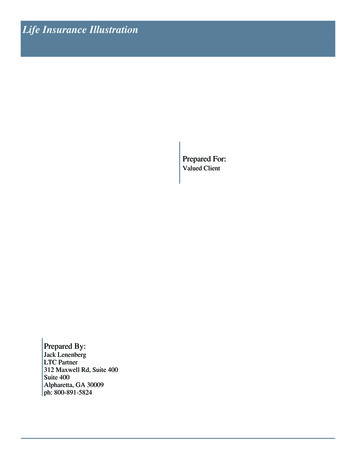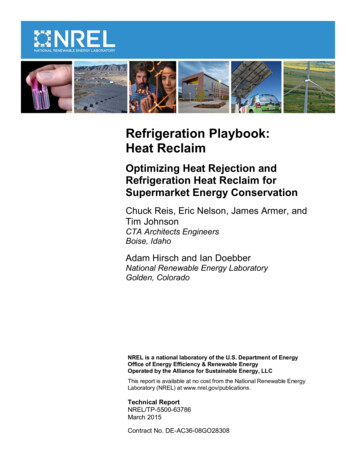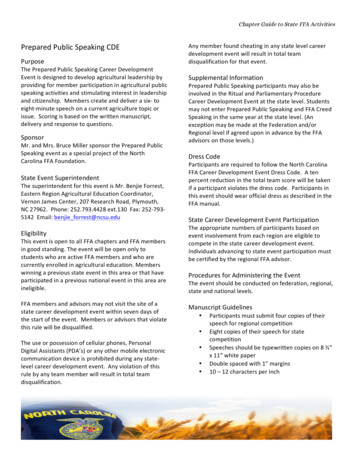
Transcription
2020AnnualLegislative SessionSummaryPrepared by theAssociation of Florida CollegesPrepared By:
2019-20ASSOCIATION OF FLORIDA COLLEGESLEGISLATIVE COMMITTEEJack Capra, Chair, Northwest Florida State CollegeJessica Kummerle, Vice-Chair, College of Central FloridaRachael Bonlarron, Palm Beach State CollegeBrian Babb, Daytona State CollegeSandy Cessaretti-Ray, Pensacola State CollegeEired Eddy, St. Petersburg CollegeJay Galbraith, Valencia CollegeCandice Grause, Tallahassee Community CollegeJack Hall, St. Johns River State CollegeVirginia Haworth, Florida State College at JacksonvilleLacey Hofmeyer, Broward CollegeRobert Jones, Florida SouthWestern State CollegeEric Johnson, Hillsborough Community CollegeLiam McClay, Santa Fe CollegeMichael McKee, Florida Gateway CollegeBill Mullowney, Valencia CollegeMaggie Perez, Miami Dade CollegeBrian Thomas, State College of Florida, Manatee-SarasotaAndy Treadwell, Indian River State CollegeMichael Brawer, Association of Florida Colleges (ex-officio)Legislative Summary Report ContributorsMichael Brawer, Association of Florida CollegesJack Capra, Chair, Northwest Florida State CollegeJessica Kummerle, Vice Chair, College of Central FloridaAFC Staff SupportSharlee Whiddon, Association of Florida Colleges2
TABLE OF CONTENTSFCS Legislative Highlights 42020-2021 FCS Program Fund Side-by-Side . . 5Other Budget Line Items . . . 5Fixed Capital Outlay . . 6Florida Financial Aid Funding Summary . . . 7Education-Related Bills that Passed . . 9Education-Related Bills that Failed . . . 12Glossary of Abbreviations and Definitions . . 183
FLORIDA COLLEGE SYSTEM APPROPRIATIONSLEGISLATIVE HIGHLIGHTSThe 2020 Florida Legislature adjourned sine die on March 19, 2020 following a budget process that resultedin the extension of the legislative session by six days to meet the required 72-hour cooling-off period. In theend, the Legislature approved the General Appropriations Act (HB 5001), appropriating an overall budget of 93.2 billion which takes effect July 1, 2020.The 2020 regular legislative session included: 3,578 Bills and PCBs filed 2,596 Amendments filed 4,223 Votes Taken 40 Floor Sessions were conducted by both chambers 210 Bills passed both chambersOf those that passed, 188 were substantive policy bills.The Governor vetoed 611 items totaling 1,000,337,940 billion.In addition to these vetoes, the Governor authorized an annual release plan for operating expenses that willprovide for a 23.5% release of authorized appropriations for each quarter of the Fiscal Year 2020-2021. Thisholdback of 6 percent is intended to curtail state agency spending during the upcoming fiscal year to allow fora review and potential reduction of non-essential services and programs. This 6% reduction will haveunanticipated impacts on the operating budgets of each of the 28 colleges in the FSC for the current fiscalyear.The Florida College System Program Fund will receive Educational Enhancement Trust Fund (Lottery)revenue of 168,247,219 ( 10.7%). In addition, 1,076,168,013 ( 1.5%) is appropriated from GeneralRevenue.Incentive funds (performance) are appropriated in two categories. 30 million is provided for the 2 2Student Success Incentive Fund. These funds support colleges efforts to improve the success of studentsenrolled in AA programs to complete critical college credits courses, earn an AA degree, and transfer to abaccalaureate program. 10 million is provided for the Work Florida Student Success Incentive Fund. These funds are to supportcollege strategies and initiative to align to align career education programs with statewide and regionalworkforce demands and high-wage opportunities. 14 million is allocated for industry certifications earned by students at colleges in specific occupationalareas. They are: public safety, health sciences, auto service technology, auto collision repair and refinishing,cyber security, cloud virtualization, network support services, computer programming, advancedmanufacturing, electrician, welding, FAA airframe and powerplant, and unmanned aircraft systems, pharmacytechnicians, and HVAC. 550,000 is allocated for Dual Enrollment instructional materials.The Florida College System will get 10,650,533 million for construction, renovation and remodeling projectsat two colleges. No maintenance, rem/ren funding has been provided.4
2020-2021 GENERAL APPROPRIATIONS ACT (GAA)FCS Program Fund (HB 5001)2019-20202020-2021Change 150,218,929 168,247,219 10.7%Program Fund – GR 1,060,005,654 1,076,168,013 1.5%Program Fund TOTAL 1,210,224,583 1,244,415,232 2.7% 14,000,000 14,000,000- 550,000 550,000- 983,182 983,182-Incentive Funding:2 2 SuccessWorkforce Success 20,000,000 10,000,000 20,000,000 10,000,000-TOTAL FCS 1,255,757,765 1,289,948,195Program Fund – EETFCAPE PerformanceIncentivesDual EnrollmentInstructional MaterialsCommission on CommunityService 34, 190, 4302.7%Other Budget Line items that could benefit the college system: Workforce Development - 10 millionFunding provided for new Pathways to Career Opportunities Grants for high schools, career centers,technical centers and FSC institutions to provide sponsored apprenticeship and pre-apprenticeshipprograms to meet demonstrated regional workforce demands. Funds may be used for instructionalequipment, supplies, personnel, student services, and other expenses associated with the creation orexpansion of a program. Workforce Diploma program - 1.5 million ( 16.7%)Funding provided to assist adults 22 years of age and older to obtain a high school diploma, anddevelop employability and career technical skills. Qualified providers must have experience indropout re-engagement. Providers are reimbursed based on the student meeting certain milestones,not to exceed 7,000 per graduate.5
FIXED CAPITAL OUTLAYHigher Education Fixed Capital Outlay Appropriations from General Revenue, Public Education CapitalOutlay (PECO) and Capital Improvement Fee Trust Fund 10,650,533 million for Florida College System projects at FGC and SSC (0 from General Revenue and 10,650,533 million from PECO) 0 for Maintenance (Sum of the Digits) for public schools, colleges or universities 48,000,000 for State University System Capital Improvement Fee Projects 85,900,352 million for State University System for projects at FAU, FGCU, FIU, and UF (0 fromGeneral Revenue and 85,900,352 million from PECO)Other Significant Education-related Fixed Capital Outlay Allocations 169,600,000 for Charter Schools for maintenance, repair, renovation and remodeling 7,038,744 for Developmental Research Laboratory Schools 41,304,151 for school district construction projects in Gilchrist, Baker, Bradford, and Levy counties. 14,387,863 from Capital Improvement Fee Trust Fund, 844,127,272 from PECO, and 17,071,094from School District and Community College Capital Outlay and Debt Service Trust Fund, forrepayments of bonds. 4,915,394 for Public Broadcasting Projects from PECO. 5,329,256 for maintenance projects at the Florida School for the Deaf and Blind.6
2020-2021 FINANCIAL AID SUMMARYSource Code: General Revenue (GR) Educational Enhancement Trust Fund (EEFT)1. FLORIDA’S BRIGHT FUTURES SCHOLARSHIP PROGRAM - 651,776,770 ( 8.7%) (EEFT)Academic Scholars – 100% of tuition and fees for fall, spring, and summer terms; 300 each fall andspring for textbooks and college-related expenses at: 4-year Institutions 2- Year Institutions Upper-division Programs at Florida Colleges Career-technical CentersMedallion Scholars – 75% of tuition and fees for fall, spring, and summer terms at: 4-year Institutions 2- Year Institutions Upper-division programs at Florida Colleges Career-Technical CentersGold Seal Vocational Scholars – awarded per credit hour or equivalent as follows: Career Certificate Program - 39 Applied Technology Diploma Program - 39 Technical Degree Education Program - 48Gold Seal CAPE Scholars Bachelor of Science Program with Statewide Articulation Agreement- 48 Florida College System Bachelor of Applied Science Program - 48Top Scholars additional stipend - 442. First Generation in College Matching Grant Program - 10,617,326 (GR) includes 2,654,332 for FirstGeneration Matching Grant Programs at Florida Colleges – match not specified. Was 2:1 in 2018-2019.3. Florida Student Assistance Grants (FSAG)- 208,666,219 (GR) and 72,255,668 (EETF) 279,921,887Maximum Award for any FSAG recipient - 3,260 Florida Student Assistance Grant – 235,293,171 FSAG Private - 23,739,177 FSAG Postsecondary - 6,791,473 FSAG Career Education - 3,572,191 Children of Deceased/Disabled Veterans - 8,432,576 Florida Work Experience - 1,569,922 Rosewood Family Scholarships - 256,747 Florida Farmworker Scholarship Program - 266,630 Honorably Discharged Graduate Assistance Program - 1,000,0004. Florida EASE (Effective Access to Student Education Grant (formerly the Florida Residence AssistanceGrant - FRAG) - 116,659,982 (GR) for 41,063 awards @ 2,8415. Florida Access to Better Learning and Education (ABLE) Florida ABLE, Inc. – 1,770,000 (GR) ABLE Grants (Private for-profit college students) - 5,025,729 (GR) for 1,769 awards @ 2,8416. Prepaid Tuition Scholarship - 7,000,000 (GR)7. Benacquisto Scholarship Program - 26,577,665 (GR)8. Minority Teacher Scholarship Program - 917,798 (GR)9. Mary McLeod Bethune Scholarship - 160,500 (GR) and 160,500 (EETF) 321,0007
10. Jose Marti Scholarship Challenge Grant - 50,00 (GR) and 74,000 (EETF) 124,0008
BILLS THAT PASSED1. CS/CS/HB 23/SB 70 Panic Alarms in Public SchoolsCiting this act as "Alyssa’s Law" it requires each public school, including charter schools, to implement a panicalert system by the 2021-22 school year. It authorizes public school districts to implement additionalstrategies and systems for specified purposes and requires the Department of Education to issue acompetitive solicitation to contract for a mobile panic alert system, subject to appropriation.HB 23, Laid on Table on 03/09/2020SB 70, signed 06/30/20202. SB 72- Postsecondary EducationThe bill modifies provisions relating to pre-eminent state research universities, the prioritization of capitaloutlay projects at Florida College System (FCS) institutions, the carry forward of operational funds at stateuniversities and FCS institutions, state student financial aid, and textbook affordability at publicpostsecondary institutions. Specifically, the bill:a) Amends the fund balance reporting requirement to local BOT by September 30 and for colleges withFTE of 15,000 or higher may include in their spending plan "A commitment of funds to a contingencyreserve for expenses incurred as a result of a state of emergency declared by the Governor pursuantto s. 252.36."b) Allows a Medallion Scholar to receive 100% scholarship (instead of 75%) if they choose to attend aFlorida College baccalaureate program instead of a University.c) Provides for the Postsecondary Career Education Assistance Grantd) Revises the data for academic and research excellence standards of preeminent research universitiesby using more timely performance data and requiring the standards to be reported annually in theBOG Accountability Plan.e) Removes funding associated with the emerging preeminent state research university designation andcreates State Universities of Distinction.f) Modifies a criterion for new construction, remodeling, or renovation projects at FCS institutions thathave not been previously state funded to be added to the Public Education Capital Outlay (PECO)priority list.g) Modifies reporting deadlines and spending plan provisions relating to the carry forward ofoperational funds at state universities and FCS institutions.h) Replaces the State University System Programs of Excellence with the State Universities ofDistinction program, and establishes requirements.i) Aligns student eligibility, maximum awards, fund distribution, remittance deadlines, and reportingrequirements between the four Florida Student Assistance Grant programs.j) Clarifies initial and renewal award requirements for the Benacquisto Scholarship Program.k) Provides that pricing and payment options relating to textbook affordability may include either anopt-in or opt-out provision for students.l) Removes the limitation that prohibits a Phosphate Research and Activities Board member fromserving more than 180 days after the expiration of his or her term, until a successor is appointed.m) Directs the Board of Governors to define in regulation the university faculty and administrativepersonnel classifications.CS/SB 72 signed 06/29/20203. SB 178/HB 579 Public Financing of Construction Projects (Rodriguez/Aloupis)9
The bill prohibits state-financed constructors from commencing construction of certain structures in coastalareas after a specified date without first taking certain steps regarding a sea level impact projection study. Italso requires the Department of Environmental Protection to develop by rule a standard for such studies andrequires the department to enforce certain requirements and to adopt rules.HB 579 Laid on Table on 03/10/2020.SB 178 signed 06/29/20204. SB 372/HB 171 Postsecondary Education for Certain Military Personnel (Sen. Lee/Rep. Ponder)The bill promotes uniformity in the application of military training and education toward postsecondarycredit (credit) or career education clock hours (clock hours) by public postsecondary educational institutionsand establishes a fee waiver for active duty members and honorably discharged veterans of the United StatesArmed Forces. Effective upon becoming law. Specifically, the bill requires:a) The Articulation Coordinating Committee (ACC) of the Florida Department of Education to convene aworkgroup to develop a process for prioritizing and determining when military courses andoccupations are appropriate for credit.b) The process must be approved by the Board of Governors of the State University System (BOG) andthe State Board of Education (SBE), in consultation with the Florida Department of Veterans’ Affairs.c) The ACC to approve a list of postsecondary course equivalencies and credit and clock hours awardedfor military courses and occupations, which must be approved by the BOG and SBE in the statewidearticulation agreement. State universities, FCS institutions, and career centers to award credit orclock hours based on the approved list.d) A state university, FCS institution, career center operated by a school district, or a charter technicalcareer center to waive transcript fees for active duty servicemembers and honorably dischargedveterans, and their spouses and dependents.SB 372, laid on the table, 03/04/2020, refer to HB 171.HB 171: Signed 06/23/20205. SB 646/HB 287- Postsecondary Student Athletes (Sen. Mayfield/Rep. LaMarca)Citing this act as the "Student Athlete Achievement Act” provides requirements for contracts made by a minoror his or her parent or guardian relating to the licensing of the minor’s name, image, or likeness whileparticipating in intercollegiate athletics. The bill prohibits a postsecondary educational institution frompreventing students participating in intercollegiate athletics from earning specified compensation. It alsoprohibits postsecondary institutions from preventing such students from earning specified compensation.The bill prohibits postsecondary institutions from preventing students participating in intercollegiateathletics from obtaining professional representation. It also specifies that a grant-in aid is not to beconsidered compensation. Effective July 1, 2021.HB 287, placed on 1st Reading on 01/14/2020CS/SB 646, signed 06/12/20206. SB 738/HB 393- Jury Service (Senator Harrell/Rep. Stone)The bill allows students who are 18 to 21 years of age (average age of system students is 26), to be excusedfrom jury service upon request if they are enrolled as a full-time student at a high school, state university,private postsecondary educational institution, Florida College System Institution, or career center.HB 393, 03/14/2020 House - Died in Higher Education and Career Readiness SubcommitteeSB 738, Signed 06/20/20207. HB 5007/SB 7044- State-administered Retirement System (AppropriationsCommittee/Cummings)10
HB 5007 passed on the House 111-5. The bill conforms the law to the House proposed 2020-21 GeneralAppropriations Act (GAA) as retirement contributions are included in the GAA. Current law requires anannual actuarial valuation of the FRS be provided by the administrator of the Department of ManagementServices and for the results to be reported to the Legislature by December 31 of each year. Thereafter, theLegislature uses the results of the actuarial valuation to establish uniform employer contribution rates duringthe next Legislative Session to ensure the FRS is funded in a sound actuarial manner. The bill revises theemployer contribution rates for the FRS based on the 2019 Actuarial Valuation.SB 7044: Laid on Table, refer to HB 5007, 02/13/2020HB 5007: signed 06/29/202011
BILLS THAT FAILED1. SB 1270/HB 1113- Fiduciary Duty of Care for Appointed Public Officials and Executive Officers(Sen. Lee/Rep. Beltran)CS/SB 1270 creates part IX of chapter 112, F.S., to establish an express fiduciary duty of care for appointedpublic officials’ and executive officers acting on behalf of governmental entities. Establishes standards forfiduciary duty of care for appointed public officials and executive officers of specified governmental entities;requires training on board governance; requires DBPR to contract for or approve such training programs orpublish list of approved training providers; specifies requirements for such training; authorizes training to beprovided by in-house counsel for certain governmental entities; requires appointed public officials andexecutive officers to certify their completion of annual training; requires department to adopt rules; providesexception to training requirement; specifies requirements for appointment of executive officers and generalcounsels of governmental entities; specifies standards for legal counsel. Would require additional 5 hours oftraining for BOT members; would also require GC's of colleges to be approved by the BOT. The bill requiresthe appointment of an executive officer or general counsel be subject to approval by a majority vote of thegoverning body of the governmental entity. The bill specifies that all legal counsel employed by agovernmental entity must represent the legal interest and position of the governing body of the governmentalentity, unless such representation is directed by the governmental entity.SB 1270 passed as amended 38-1, CS passed as amended in House 117-0, message sent to senate on03/11/2020HB 1113, referred to Government Operations and Technology Appropriations Subcommittee on02/06/2020, died in Committee2. SB 62- K-12 Education (Sen. Stargel)The CS as amended would Requiring that a resolution to levy discretionary sales tax include a statementcontaining certain information; defining the term “early college program”; changing the calculation of fulltime equivalent student membership for dual enrollment purposes; providing for calculation of full-timeequivalent membership for students earning the Capstone Diploma; requiring school board mental healthpolicies and procedures to include certain items.As amended this bill would have included language for funding in the GAA for the “DE Scholarship program”to pay for private and home school students, tuition and materials, to offset the costs of Colleges having toprovide these for free, also under this bill. Would include fall and spring 2020, and summer starting in 2021.Moved much of the DE language from SB 1246. Instructional materials are free-of-charge for students inprivate schools and home education programs. Private schools are exempt from the payment of tuition andfees for dual enrollment. Adds new requirements to the mental health plans that school districts and charterschools must submit in order to receive the mental health assistance allocation in the FEFP. Creates a newcategorical in the FEFP to assist districts in increasing teacher salaries. Removes the July 1, 2020, expirationdate for the funding compression allocation within the FEFP. Provides an exception that, if a new constructionproject is funded solely through local impact fees, such funds are exempt from the total cost per studentstation requirements.Temporarily postponed at the second to last Senate Appropriations meeting on 03/03/2020. Died incommittee.3. HB 187- Postsecondary Education for Secondary Students (Zika)Passed favorably in the Education Committee. It now heads to the House floor. The bill renames “collegiatehigh school programs” as “early college programs,” expands the programs from 1 to 2 years, and allows12
charter and private schools to establish programs with a state college, state university, or other eligiblepostsecondary institution. Provides free instructional materials to certain DE students.The bill requires the programs be made available to students in grades 11 and 12 and specifies that they mustinclude an option for a student to graduate from high school with an associate degree. The bill also prohibitsdistrict school boards and Florida College System (FCS) institutions from limiting the number of eligiblestudents who may enroll in dual enrollment programs, including early college programs, unless a 1-yearwaiver is granted by the Commissioner of Education.The dual enrollment articulation agreement between a FCS institution and a school district must include atleast one early admission program, career early admission program, or early college program. The billrequires articulation agreements to address the costs associated with courses delivered using technology tobe borne by both entities. The bill establishes reporting requirements for district school boards,postsecondary institutions, and the Department of Education (DOE) regarding early college programs anddual enrollment articulation agreements.The bill requires home education students to meet the same minimum common placement test score as otherdually enrolled students for participation in college credit dual enrollment and limits the college credit dualenrollment exceptions to students who exceed the minimum score on the common placement test. The billrequires the dual enrollment transfer guarantees statement developed by the DOE to identify English andmathematics courses that require a grade of “C” or higher and include a notice stating that grades in collegecredit courses remain on the student’s permanent record.The bill appropriates 550,000 in recurring funds from the General Appropriations Act to the DOE for FiscalYear 2020- 2021. The bill has an indeterminate fiscal impact on public postsecondary institutions.Added to 2nd Reading Calendar on 02/24/2020. Not heard on floor in the House4. HB 613- Higher Education (Rep. Rodrigues)The bill modifies state university performance funding metrics to include metrics that focus on the successrate of “2 2” Associate in Arts (AA) degree transfer students and Pell Grant students; and prohibits theadjustment of such metrics once data has been received. Requires Florida College System (FCS) institutionsand state universities be given the choice to provide either an opt-in or an opt-out provision to studentsregarding textbook and instructional materials affordability. Aligns requirements for the financial aidprograms in the Florida Student Assistance Grant program and aligns the requirements of the BenacquistoScholarship Program to other state scholarship programs. As amended would have also included languagerevising fund balance deadlines, much of this was moved into SB 72.Laid on Table on 3/10/202.5. HB 725/SB 418- Workforce Education (Diaz/Robinson)This bill amends s. 1011.80, F.S., to authorize a school district career center to conduct an associate in appliedscience or an associate in science nursing degree program if the career center offering the associate in sciencenursing degree program offers it only to graduates of a licensed practical nursing program offered by thesame center. Effective Date: 7/1/2020. Revises workforce education programs that school district careercenters are authorized to conduct.On 12/09/19 Sen Stargel voted and spoke against SB 418 in the Senate Education Committee where it passed6-1. However, the Senator did not let SB 418 be heard in the Senate Appropriations Committee. Signaling thatHB 725 would not have a companion in the Senate. It did not. Nevertheless, the House pushed the issue andpassed HB 725 117-0 on 02/02/220HB 725: Passed House 117-0 on 02/02/2020. Received in Senate 3/2/20 (took no action)13
SB 418: Died in Committee6. SB 774/HB 7081- Public Records and Meetings/Applicants for President/State University orFlorida College System Institution (Sen. Diaz/House State Affairs Committee-Rep. Latvala)The bill provided an exemption from public records requirements for any personal identifying information ofan applicant for president of a state university or Florida College System institution and an exemption frompublic meeting requirements for any portion of a meeting held for the purpose of identifying or vettingapplicants for president of a state university or Florida College System institution, including any portion of ameeting that would disclose identifying information of such applicants. It provided for future legislativereview and repeal of the exemptions and required a providing a statement of public necessity. The billprovides that the exemption is subject to the Open Government Sunshine Review Act, and so is repealed onOctober 2, 2025, unless saved from repeal by the Legislature.SB 774, Placed on Special Order Calendar, 03/12/20HB 7081, passed House 99-20, on 03/04/2020, received by Senate on 03/05/2020; never heard in theSenate floor7. HB 953- Charter Schools (McClain)This bill authorizes state universities and Florida College System (FCS) institutions to solicit applications andsponsor charter schools upon approval by the Department of Education (DOE). The bill also revisesrequirements for charter schools operated by a FCS institution with a teacher preparation program. The billprovides that the board of trustees of a sponsoring state university or FCS institution is a local educationalagency for the purpose of receiving federal funds and accepting responsibility for all requirements in thatrole. The bill requires the DOE, in collaboration with charter school sponsors and operators, to develop asponsor evaluation framework and report results in its annual charter school application report. In addition,the bill revises charter school application reporting requirements and submission dates for both sponsorsand the DOE. The bill establishes operational funding and capital outlay funding formulas for charter schoolssponsored by a state university or FCS institution. The bill authorizes charter schools to provide career andprofessional academies.Added to Second Reading Calendar on 02/17/2020. Not heard on House floor8. HB 1111/SB 1538- Government Integrity (Rep. Tomkow/Sen. Gruters)Creates the Florida Integrity Office under the Auditor General for the purpose of ensuring accountability andintegrity in state and local government and facilitating the elimination of fraud, waste, abuse,mismanagement, and misconduct in government. Requires the Chief Inspector General (CIG) and agencyinspectors general to determine whether there is reasonable probability that fraud, waste, abuse,mismanagement, or misconduct in government has occurred within six months of initiating an investigationof such activity. Among other things it provides a mechanism for the state to recover funds when the CIG oran agency inspector general determines a public official, independent contractor, or agency has committedfraud, waste, abuse, mismanagement, or misconduct in government. It also prohibits state or local taxincentive funds from being used to award or pay a state contractor for services provided or expendituresincurred pursuant to a state contract. For agency contracts over 50,000, requires a contractor to include inthe contract a good faith estimate of gross profit for each year of the contract, provides a process for theagency to review such estimate, and provides financial penalties for a contractor who misrepresents theestimate. To increase accountability, the bill requires the DOE IG to also investigate allegations or reports ofpossible waste, fraud, abuse, or mismanagement against a Florida College System institution made by anymember of the Cabinet, the presiding officer of either house of the Legislature, a chair of a substantive orappropriations committee with jurisdiction, or a member of the board for which an investigation is sought.Additionally, the bill also requires the DOE IG to investigate allegations or reports of possible waste ormismanagement against a district school board made by any of the previously referenced members orofficers.14
CS/HB 1111, Temporarily postponed, on 3rd Reading 03/11/2020.SB 1538, referred to several committees. Died in committee.9. CS/HB 1185 - Ethics Reform (Brannan)Repeals provisions relating to state, state university, and community college employee lobbyists; prohibitscertain public service announcements by specified entities or persons; prohibits certain public officers andemployees from soliciting employment and contractual relationships; provides exception and disclosurerequirements; revises lobbyist registration, compensation report, principal designation cancellation, andinvestigation requirements.CS passed 115-0 on 02/26/2020. Received by Senate on 03/05/20; Died in commi
Jack Capra, Chair, Northwest Florida State College Jessica Kummerle, Vice-Chair, College of Central Florida Rachael Bonlarron, Palm Beach State College Brian Babb, Daytona State College Sandy Cessaretti-Ray, Pensacola State College Eired Eddy, St. Petersburg College . Replaces the State University System Programs of Excellence with the State .









